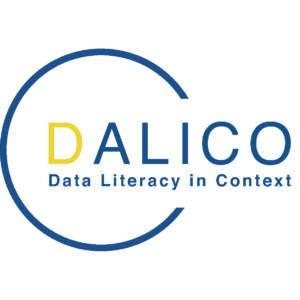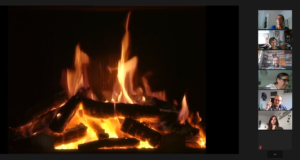Dissemination on DaLiCo and Data Literacy by the DaLiCo team
Articles / Papers
Paper on measuring data literacy competencies, regarding governmental organizations
Ongena, Guido (2022): Data literacy for improving governmental performance: A competence-based approach and multidimensional operationalization, Digital Business, 2022, 100050: https://doi.org/10.1016/j.digbus.2022.100050
Article on the increased need for data literacy education in higher education
Gläser, Christine, Spree, Ulrike (2022): Finding Access Points for Data Literacy: The Example of the ERASMUS+ Project DaLiCo (Data Literacy in Context). In: Kurbanoğlu, S., Špiranec, S., Ünal, Y., Boustany, J., Kos, D. (eds) Information Literacy in a Post-Truth Era. ECIL 2021. Communications in Computer and Information Science, vol 1533. Springer, Cham.
https://doi.org/10.1007/978-3-030-99885-1_10
Article on potentials of digital teaching
https://www.stifterverband.org/download/file/fid/10642
Article on impulses from the DaLiCo project
Ameis, Kristin, Gläser, Christine and Spree, Ulrike (2021): “„Put your data goggles on“ – Impulse aus dem DaLiCo-Projekt” Bibliothek Forschung und Praxis, vol. 45, no. 3, 2021, pp. 527-532.
https://doi.org/10.1515/bfp-2021-0045
Article on the search studies group at Hamburg University of Applied Sciences (HAW Hamburg)
Lewandowski, D., Sünkler, S., Schultheiß, S. et al. (2021): The Search Studies Group at Hamburg University of Applied Sciences. In: Datenbank Spektrum 21, 145–154 (2021).
https://doi.org/10.1007/s13222-021-00375-x
Article on the experiences during the first DaLiCo Summer School
Kristin Ameis, (2021): „What makes us happy“ – Internationale Begegnungen im virtuellen Raum. In: API Magazin 2021, 2(1).
https://doi.org/10.15460/apimagazin.2021.2.1.60
Article on Data Literacy in Teaching at the Department of Information
Christine Gläser (2020): Wer spricht die Sprache der Daten. In: API Magazin 2020, 1(2).
https://doi.org/10.15460/apimagazin.2020.1.2.48
Presentations at Conferences
EAHIL 01-03.06.2022 Rotterdam, Netherlands
- Görögh, Edit and Fazekas-Paragh, Judit (2022-06-02): Teaching data literacy in academic libraries. https://www.conftool.net/eahil2022/
BOBCATSSS 23.-25.05.2022, Debrecen, Hungary
- Görögh, Edit and Fazekas-Paragh, Judit (2022): Teaching data literacy in academic libraries. In: Data and Information Science. Book of abstracts. BOBCATSSS 2022, Debrecen. P. 67: https://serwiss.bib.hs-hannover.de/frontdoor/deliver/index/docId/2312/file/bobcatsss30-book_of_abstracts.pdf
ECIL 20.-23.09.2021, online
- Gläser, Christine, Spree, Ulrike (2022): Finding Access Points for Data Literacy: The Example of the ERASMUS+ Project DaLiCo (Data Literacy in Context). In: Kurbanoğlu, S., Špiranec, S., Ünal, Y., Boustany, J., Kos, D. (eds) Information Literacy in a Post-Truth Era. ECIL 2021. Communications in Computer and Information Science, vol 1533. Springer, Cham: https://doi.org/10.1007/978-3-030-99885-1_10
Press // Articles about DaLiCo
Report on DaLiCo project
- Yvonne Scheller (18.01.2021): Wie datenkompetent sind wir wirklich? HAW Hamburg: https://www.haw-hamburg.de/detail/news/news/show/wie-datenkompetent-sind-wir-wirklich/
Report on the virtual Summer School 2020
- Gläser, Christine (2020): DaLiCo Team zieht positive Bilanz der ersten Summer School. HAW Hamburg: http://haw-hamburg.de/detail/news/news/show/dalico-team-zieht-positive-bilanz-der-ersten-summer-school/
- Conejero, J. Alberto (2020): DaLiCo Summer School on Open (Governmental) Data: https://albertoconejero.webs.upv.es/780-2/
Report on the virtual Summer School 2021
- Ameis, Kristin (2021): Virtuelle Summer School 2021. HAW Hamburg: https://www.haw-hamburg.de/detail/news/news/detail/virtuelle-dalico-summer-school-2021/
DaLiCo Summer School 2020 – Follow-up report
Dr. Marlies van Steenbergen and Cathelijn Timmers (Hogeschool Utrecht, The Netherlands) particularly raised awareness of ethical issues. They demonstrated tools and techniques that sharpen the view on controversial backgrounds when dealing with data and help to include basic ethical questions in the planning and design of data projects.
The successful composition of the teams further promoted competencies and enabled mutual learning. The decision to dispense with web tools for data manipulation and simple statistics, which hide the actual processes of data manipulation, proved to be exactly right with regard to the goal of promoting data competence and critical thinking.
On the other hand, the provision of Excel templates (e.g. for the creation of a new index) has taken away the fears of individual participants about statistics. Some teams focused on data research in their projects and used the templates for analysis. More ambitious teams have used other methods based on this template (nearest neighbour).
More difficult than expected has been the acquisition of the participants themselves. The DaLiCo team had assumed that they would have more applicants than places at a workshop with proven experts and coaching in small groups, which was free of charge for the participants. In fact, with the switch to the virtual environment and postponing into the fall, neither the university in Debrecen (Hungary) nor in Hamburg were able to find interested PhD students for the Summer School. In Hamburg, it was the university-wide distribution of the call that generated a broad echo and interest, especially among the group of international students. The other students – according to a preliminary interpretation – are obviously too involved in their respective courses of study, so that the benefits of extracurricular activities are not immediately apparent or the time available simply does not allow it.
Ultimately, a central goal of the DaLiCo project is to strengthen data literacy at the partner universities as a whole and to network activities. The results and experiences from the Summer School will be useful for future project activities. The HAW Hamburg team will also approach individual colleagues as well as faculties and departments in the coming weeks. We are looking forward to your experiences and ideas on this topic.
The data stories developed during the Summer School can be read on the project website at projects.dalico.info
For members of HAW Hamburg the lectures and materials are accessible via an EMIL room. Interested parties* please contact christine.glaeser@haw-hamburg.de

